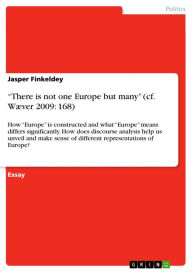'There is not one Europe but many' (cf. Wæver 2009: 168): How 'Europe' is constructed and what 'Europe' means differs significantly. How does discour
by Jasper Finkeldey
2020-05-08 08:20:04
'There is not one Europe but many' (cf. Wæver 2009: 168): How 'Europe' is constructed and what 'Europe' means differs significantly. How does discour
by Jasper Finkeldey
2020-05-08 08:20:04
Essay from the year 2011 in the subject Politics - International Politics - Topic: European Union, grade: 1,3, University of Hamburg, language: English, abstract: European nation states are being incorporated in many different formations on the inter...
Read more
Essay from the year 2011 in the subject Politics - International Politics - Topic: European Union, grade: 1,3, University of Hamburg, language: English, abstract: European nation states are being incorporated in many different formations on the international and supranational level such as the European Union or the World Trade Organization. The ongoing process of integration challenges the 'old' image of the sovereign Westphalian state. Looking at the concept of the European nation state in the light of European Integration today, it is hard to approach changes by means of commonly used approaches. It often seems like 'we analyse the future by the standards of the past' still applying customary concepts to the latest developments in IR (Anderson 2003: IX). Introducing constructivist approaches to European Integration Theory (EIT) allows scholars to 'take a step back' and to look at the categories used to describe Integration themselves - in other words the construction of the categories of European Integration (ibid.). Discourse approaches can be understood as both a methodology and theory. While discourse analysis as a method is used to complement a wide range of theories in EIT already, discourse theory - after his founding father Michel Foucault - is interested in deconstructing the hegemonic discourse in any given society (Mole 2007: 19)1. I will use the term discourse in the following as a 'system that regulates the formation of statements' (Wæver 2009: 164)2. It is thereby important that theorists applying discourse analysis are not interested in the meaning of 'things' for themselves but how these 'things' become meaningful in discourse (ibid.). In the next chapter I start by explicating the historical roots of discourse analysis and give a broader outline of its contents. The categories used to construct 'Europe' are numerous and differ completely as I will show. Wæver therefore subsumes that 'there is not one Europe but many' (Wæver 2009: 168). In this respect I will critically assess two different discursive approaches in this paper3. I will focus on the approach 'Foreign policy Explained from concepts of State, Nation and Europe' advocated by Wæver et al. and give a more detailed account of the example of 'three competing 'Europes'' (Wæver 1990). Hereby I will argue that discursive approaches fill gaps that conventional approaches fail to take account of which I will specify in the passage dealing with 'approaches in European Discourse Theory'.
Less











.jpg)


















